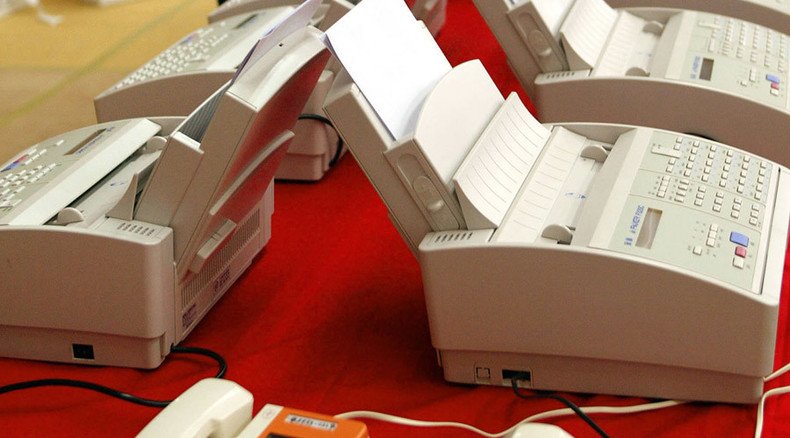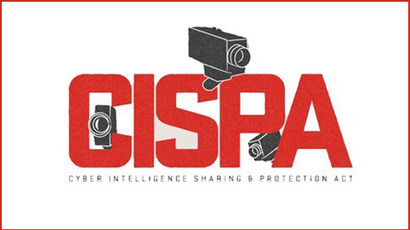Analog resistance: Activists protest CISA by faxing Congress

Privacy activists are flooding Congress with messages of opposition to the cyber surveillance bill due to be considered by the Senate, using faxes rather than emails in order to poke fun at lawmakers’ antiquated understanding of technology and privacy.
Fight for the Future, a nonprofit fighting for privacy and against government surveillance, has set up a page dubbed “Operation: Fax Big Brother,” which lets anyone generate and customize a fax protesting the Cybersecurity Information Sharing Act (CISA). Each fax is then sent to all 100 Senators. The group has not said how many faxes have been sent so far.
Let's tell Congress to #StopCISA in a language they understand! Click here to send a fax https://t.co/1t9LMcsCDepic.twitter.com/gxp6TmeTY9
— Access (@accessnow) July 27, 2015CISA sailed through the Senate Intelligence Committee in March, with Oregon Democrat Ron Wyden being the sole dissenter. Senate is expected to take up a vote on the bill before the August 7 recess. A similar proposal, known as CISPA, was approved by the House of Representatives in 2013 but died in the Senate after public opposition compelled President Barack Obama to threaten a veto.
“Groups like Fight for the Future have sent millions of emails, and they still don’t seem to get it,” Evan Greer, the group’s campaign manager, told the Guardian. “Maybe they don’t get it because they’re stuck in 1984, and we figured we’d use some 80s technology to try to get our point across.”
According to the group, since 2012 civil liberties activists have sent hundreds of thousands of calls and tweets and over 2.6 million emails to Congress opposing overreaching cybersecurity laws. However, the fax stunt does not just have publicity value. Lawmakers often use analog technology like faxes and pagers in order to hide their digital tracks from Freedom of Information Act (FOIA) inquiries, claims a Senate staffer who spoke to the Guardian.
This tweet is a fax to Congress to stop US' mega-surveillance bill http://t.co/MgjbpQJBTG#FaxBigBrother#StopCISApic.twitter.com/KzDkMq8w6V
— OpenMedia (@TheOpenMedia) July 27, 2015Sponsored by Senator Dianne Feinstein, a California Democrat, CISA seeks to enlist the support of corporations in collecting user data in the name of cybersecurity, providing them with liability protection if they share the data with federal agencies such as the NSA. Once they have the data, federal agencies would be able to share it freely with each other. What’s more, information shared with the government by the companies will be specifically exempt from FOIA disclosures.
Gabe Rottman, a legislative counsel with the American Civil Liberties Union, described the bill as a “new and vast surveillance authority that might as well be called Patriot Act 2.0 given how much personal information it would funnel to the NSA."
The US Chamber of Commerce and a number of major corporations are backing the bill. In addition to Facebook and Google, Comcast and AT&T also favor CISA, as do Bank of America and Blue Cross Blue Shield Association.
This is awesome: Fax Congress and tell them to give up on dumb intel-sharing-as-spying-and-immunizing bills.
https://t.co/Ob3140DXmO
— emptywheel (@emptywheel) July 27, 2015Proponents of CISA have cited a spree of data breaches over the past year, from corporations such as Sony and healthcare provider Anthem to government agencies including the Department of State and Office of Personnel Management (OPM), as a reason to beef up cybersecurity. Critics have countered that CISA is not doing anything to protect networks from threats, and everything to vacuum up Americans’ data.
“With all these breaches, there’s a lot of fearmongering going on in DC,” says Fight for the Future’s Greer. “They just say: ‘This is a problem – we’ve got to do something!’ And this is the something they’re going to do. It’s not just that this won’t fix things – it’ll make them worse. And it’ll give sweeping legal immunity to some of the largest companies in the world and open us all up to new forms of surveillance.”















